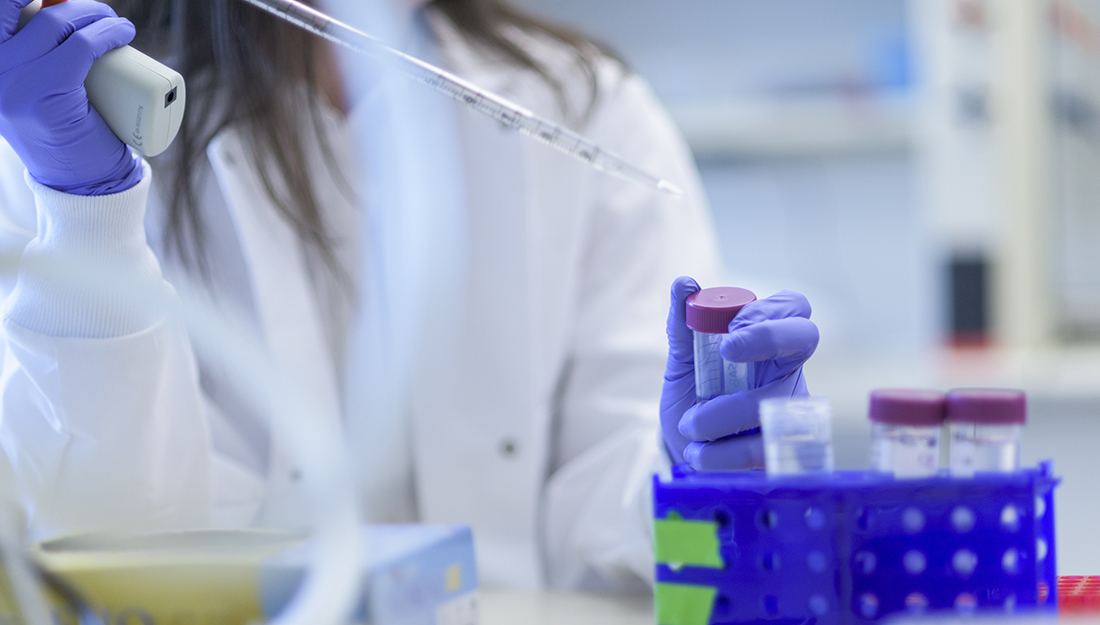- Christina Sumners
- COVID-19, Medicine, Show on VR homepage
Researchers receive NSF grant to develop new therapeutics to combat COVID-19
Grant from the National Science Foundation will help develop a device to detect pathogen-specific neutralizing antibodies

Researcher in a laboratory performing experiments
A Texas A&M University team of scientists and engineers is leading the development of a device that can be used to rapidly identify antibodies produced by human B cells that can neutralize infection by SARS-CoV-2, the causative agent of COVID-19.
As we all see from the unfolding COVID-19 pandemic, when a new viral threat emerges, there are neither therapeutics nor vaccines available. Developing new therapeutics and vaccines is extremely difficult, time-consuming and costly, and possible mutation of viruses makes it extremely challenging.
The team, led by Paul de Figueiredo, PhD, associate professor in the College of Medicine, and Arum Han, PhD, professor and Presidential Impact Fellow in the Department of Electrical and Computer Engineering, in collaboration with Julian Leibowitz, MD, PhD, a coronavirus expert and professor in the College of Medicine; and Mike Criscitiello, PhD, immunologist, assistant dean for research and graduate studies and professor at the College of Veterinary Medicine & Biomedical Sciences, received a National Science Foundation Rapid Response Research (RAPID) grant to pursue this work.
“The difficulty of developing therapeutics and vaccines against emerging viral threats can also be obviously seen from the fact that we still do not have therapeutics or vaccines against two previous major viral outbreaks, namely SARS (Severe Acute Respiratory Syndrome) in 2003 and MERS (Middle East Respiratory Syndrome) in 2012, where no FDA-approved vaccine or therapeutic exist,” Han said.
Some of the most promising strategies to combat these types of viruses include the use of pathogen-specific neutralizing antibodies (nAbs). These are molecules produced by human B cells that can bind to invading viruses and neutralize their capability for infection. Identifying nAbs is a first step toward developing therapeutics and vaccines.
Han explained that conventional approaches for identifying nAbs are extremely time-consuming, inefficient and costly due to the billions of potentially unique B cells in the human body that produce antibodies. To find those that neutralize a specific viral infection such as SARS-CoV-2, a very large percentage of the billions of cells have to be tested one at a time to see whether the antibody they produce prevents infection. This pursuit is essentially like finding a needle in a haystack and cannot be easily performed using current technology.
Enter the microfluidic lab-on-a-chip device, PRESCIENT (Platform for the Rapid Evaluation of antibody SucCess using Integrated microfluidics ENabled Technology).
“This hunt for neutralizing antibodies takes place at the sub-microscopic level in reaction vessels that are more than a million times smaller than a cup of coffee. (This device) utilizes droplet microfluidics technology, where millions of such pico-liter-volume bioreactors, each containing unique antibody-producing cells, are generated and each of the cells in the pico-liter bioreactors are tested one at a time to assess whether they produce antibodies that can prevent infection,” Han said. “This entire process can be conducted at very high speed, up to hundreds of tests per second.”
So far, the team has successfully built a prototype device and tested its feasibility using the hepatitis virus, a type of coronavirus, and demonstrated that antibodies produced by a single cell could neutralize infection of the virus within the pico-liter-volume bioreaction chamber. This work has now been accepted by the journal Lab on a Chip and will be published in an upcoming issue.
As the ongoing COVID-19 crisis unfolds, the team is currently working to repurpose the PRESCIENT microfluidic device to rapidly identify neutralizing antibodies against the current pandemic. The team hopes that once neutralizing antibodies are discovered, they can then be quickly utilized to develop therapeutics and vaccines to combat COVID-19.
This article, written by Rachel Rose, was originally published by the College of Engineering.
Media contact: media@tamu.edu


